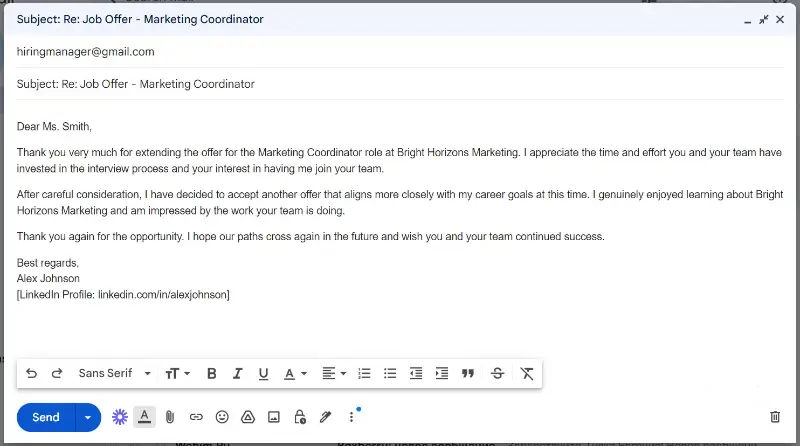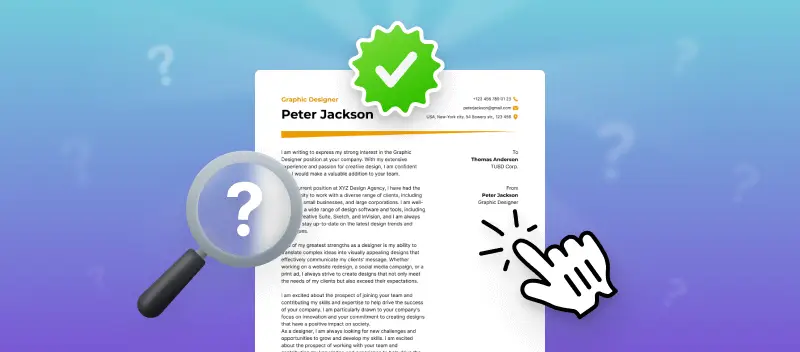Knowing how to ask for feedback after an interview is an essential skill that can help you grow professionally.
Many job candidates often feel uncertain about the best approach, whether it's by email or phone. The key is to approach the situation thoughtfully, ensuring your request is respectful and constructive.
In this article, we'll explore various strategies to ask for valuable feedback that can guide your future interviews.
Why is it important to ask for feedback after an interview?
1. Opportunity for Improvement
Requesting feedback helps identify specific areas where you can enhance your performance. Whether it's refining how you answer questions or showcasing your skills better, their response gives you a clear path forward.
2. Gain Employer Insights
Getting feedback allows you to understand the interview from the employer’s perspective. It helps clarify why they chose a different candidate and sheds light on their expectations for the role.
Example: If the recruiter indicates that they were looking for more technical expertise, you now know to strengthen those skills for your next opportunity.
3. Demonstrates Professionalism
Asking for interview feedback shows that you’re open to constructive criticism and are not deterred by setbacks. This professional attitude reflects well on you and sets you apart from others.
4. Cultivates Future Connections
By politely requesting feedback, you maintain a good relationship with the HR. A respectful approach can turn the interview into a networking opportunity, possibly leading to future openings.
According to LinkedIn, 70% of professionals land their jobs through networking. This can be the first step toward building such relationships.
5. Avoiding Repetitive Mistakes
Critique helps pinpoint recurring issues that may affect your performance. Without it, you risk repeating the same errors in subsequent interviews.
Best times to ask for interview feedback
- After the initial screening
You can ask for feedback after initial interview screening, but it's generally less common. This phase is often more about assessing whether your qualifications meet the basic requirements of the job.
If you’re rejected after a screening, you can say:
“Thank you for considering my application. I understand that I won’t be moving forward, but I would appreciate any feedback you can provide regarding my screening interview. It would be helpful to improve for future opportunities.”
If you're still in the running, you could phrase it like this:
“Thank you for the opportunity to interview. I’d love to know if there are any areas you think I could improve on for the next stages of the interview process.”
- After receiving the outcome
The ideal time for asking the interviewer for feedback is after you’ve received the final decision. This gives you closure and context for the critique you’re requesting.
The decision is fresh in the recruiter’s mind, and they are more likely to provide useful insights into why you were or weren’t chosen.
“Thank you for informing me about your decision. While I understand I wasn’t selected, I’d greatly appreciate any feedback to help me improve for future opportunities.”
- Within 24-48 hours
Requesting feedback right after or a couple days later shows that you are prompt, respectful, and genuinely interested in improving.
“Thank you for taking the time to meet with me. I would love any feedback on how I performed, as it will help me continue to improve in my job search.”
- When you're nearly a finalist
If you've made it to the final stages of the hiring process but didn’t land the job, asking for feedback after an interview can help you understand where you missed out and how to refine your approach.
“Thank you for considering me for the role. Could you share any feedback on my interview performance? I’d appreciate your insights for future opportunities.”
- When you’ve had several interviews
If you've had multiple rounds with the same employer and didn't get the position, it’s appropriate to ask for feedback after the last round. The recruiter may have detailed insights into what worked and what didn’t throughout the entire process.
“I appreciate the time you took to meet with me over the past few weeks. Could you share any feedback from our conversations that would help me improve in future opportunities?”
How to ask for feedback after an interview?
1. Be Polite and Appreciative
Express your gratitude for the opportunity and be respectful in your tone. Keep it brief and avoid sounding demanding.
“Thank you so much for taking the time to interview me for the marketing manager position. I appreciate the opportunity to learn more about your company.”
2. Ask Specifically for Constructive Feedback
You want actionable feedback that will help you improve. Be specific about what kind of feedback you're seeking.
“If possible, I’d love to hear any feedback on how I can improve for future interviews. Was there anything in my responses or qualifications that you feel I could strengthen?”
3. Make it Clear You're Seeking Growth, Not Criticism
Frame your request as an opportunity for self-improvement, which shows maturity and a desire to learn.
“I’m always looking to improve, and any insights you can provide on my interview would be incredibly valuable to me for future opportunities.”
4. Be Professional
Even if the outcome wasn’t what you hoped for, maintain professionalism. Don’t come across as defensive, and always thank the recruiter for their time and consideration.
“Although I was disappointed to hear that I wasn’t selected for the role, I would really appreciate any feedback you could share with me to help with my job search.”
5. Keep it Short and Concise
Your message should be to the point. Avoid lengthy emails, and be respectful of the interviewer's time.
“Thank you for the opportunity to interview for the software engineer position. I’d be grateful for any feedback on how I can improve in future interviews. I appreciate your time and consideration.”
How to ask for interview feedback after not getting a job?
- Should you ask for feedback after job rejection?
- Yes, it’s a good idea to ask for interview feedback after rejection. While it can feel a bit uncomfortable, understanding what you could have done differently can make you more competitive next time.
Acknowledge their decision and express your interest in learning how you can improve.
Make targeted questions that can give you concrete information. For example, inquire about whether you lacked certain qualifications or if your responses could be improved.
"Thank you again for the opportunity. If you have a moment, I’d be grateful for any feedback you can share to help me improve in future interviews."
If you do receive feedback that’s difficult to hear, stay calm and appreciative. Avoid responding defensively or making excuses. Instead, use the feedback constructively.
"I appreciate you taking the time to share that with me. I will certainly work on improving in that area moving forward."
Examples of how to ask for feedback after interview
Rejection
Example 1:
"Thank you for letting me know about your decision. While I am disappointed I won’t be moving forward, I would really appreciate any feedback you could provide on my interview performance. Your insights would be incredibly helpful for me as I continue my job search."Example 2:
"I appreciate the opportunity to interview for the software engineer position at TechSolutions. Although I wasn't selected, I would be grateful if you could share any feedback on how I can improve in future interviews. Thank you for your time and consideration."
Shortlisted but Not Chosen
Example:
"Thank you for considering me for the senior project manager position at ConstructCo. I understand that I wasn't selected, but I would love to hear any feedback you can offer on my interview. Was there anything specific that led to your decision? I’d appreciate your thoughts as I look to improve for future opportunities."
Still in the Running
Example:
"Thank you for the opportunity to interview for the content strategist position at Creative Agency. I’m excited about the next steps. If you have any feedback from the first round, I’d love to hear it so I can better prepare for the upcoming stages."
When You Feel Unsure About How You Did
Example:
"Thanks for the opportunity to interview with you. If you’re able to share any thoughts or feedback on how I did, I’d be grateful—it will help me in preparing for future opportunities."
How to respond to feedback?
1. Express Gratitude
Whether the feedback is good or bad, start by thanking the person for their time and insights. This shows that you value their perspective.
"Thank you for taking the time to provide this feedback. I really appreciate your insights."
2. Acknowledge the Feedback
Show that you understand the critique and are open to hearing it. You don't need to agree with everything, but acknowledging helps establish a constructive dialogue.
"I understand that I could have communicated my ideas more clearly in the meeting. I’ll work on improving that."
3. Offer Solutions or Actions
If the feedback includes areas for improvement, show that you’re committed to taking action. Discuss any steps you plan to take to address the insights.
"I’ll be setting up a system to prioritize tasks better so that I can meet deadlines more effectively."
Conclusion
As you now know, learning how to ask for feedback after an interview can significantly improve your chances in future job opportunities.
By being polite, concise, and open to constructive criticism, you can gain insights that not only enhance your performance but also contribute to your overall professional development.
Don't shy away from feedback—use it as a stepping stone toward success.
Create your professional Resume in 10 minutes for FREE
Build My Resume






